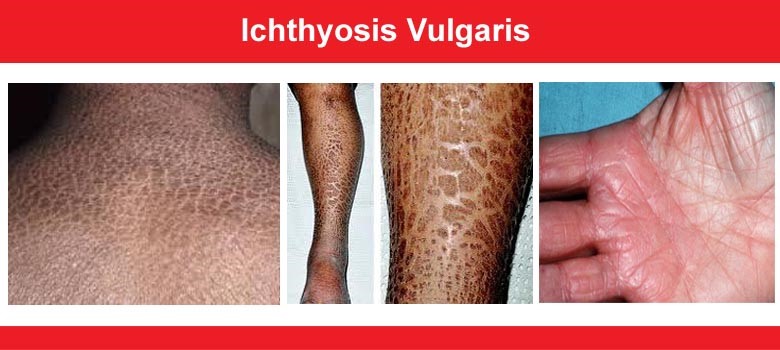Ichthyosis - Symptoms, Causes, Prevention & Homeopathic treatment

Overview
Ichthyosis is a group of genetic skin disorders characterized by dry, scaly skin. The condition ranges from mild to severe and can affect various parts of the body. Ichthyosis often begins in infancy or childhood and can be a lifelong condition. While conventional treatments focus on managing symptoms, homeopathy offers a holistic approach to address both the skin’s appearance and underlying factors contributing to the disorder.
Symptoms
Ichthyosis presents with a range of symptoms, including:
- Dry, Scaly Skin: The skin appears dry and flaky, with scales that can vary in size and shape.
- Thickened Skin: Areas of the skin may become thickened and rough.
- Itching and Discomfort: The affected skin can be itchy or uncomfortable, particularly in severe cases.
- Redness and Inflammation: In some instances, there may be redness or inflammation around the scales.
- Cracking and Bleeding: Severe ichthyosis can lead to cracks in the skin that may bleed or become infected.
When to see a doctor
Consult a healthcare provider if:
- Severe Symptoms: The symptoms are severe, widespread, or worsening over time.
- Infection Signs: There are signs of infection, such as increased redness, swelling, or pus.
- Associated Symptoms: You experience other health issues alongside skin symptoms, such as joint pain or fever.
- Lack of Improvement: Conventional treatments or skincare routines are not providing relief or improving the condition.
Causes
Ichthyosis is primarily caused by genetic mutations that affect the skin’s ability to shed dead cells. The main types and their causes include:
- Ichthyosis Vulgaris: Caused by a genetic mutation affecting the filaggrin protein, which is important for skin barrier function.
- X-linked Ichthyosis: Linked to mutations in the STS gene on the X chromosome, affecting skin cell turnover.
- Congenital Ichthyosiform Erythroderma: Caused by mutations in genes related to skin development and barrier function.
- Harlequin Ichthyosis: A severe, rare form caused by mutations in the ABCA12 gene, leading to extremely thick skin and other severe symptoms.
Risk factors
Risk factors for ichthyosis include:
- Genetic Predisposition: A family history of ichthyosis or other genetic skin disorders increases the risk.
- Inheritance Patterns: Some forms of ichthyosis are inherited in an autosomal dominant or recessive manner.
- Gender: Certain types, such as X-linked ichthyosis, are more common in males due to their X-linked inheritance pattern.
Complications
Potential complications of ichthyosis can include:
- Skin Infections: Cracked or damaged skin is more prone to infections.
- Heat Intolerance: Thickened skin may impair the body’s ability to regulate temperature.
- Social and Emotional Impact: Visible skin changes can affect self-esteem and social interactions.
- Additional Health Issues: Severe forms may be associated with other health problems, such as eye issues or joint deformities.
Preventions
While ichthyosis cannot be prevented due to its genetic nature, you can manage and reduce the impact of symptoms by:
- Moisturizing: Regular use of emollients and moisturizers to keep the skin hydrated.
- Gentle Skin Care: Using mild, non-irritating soaps and avoiding harsh scrubbing.
- Avoiding Hot Water: Using lukewarm water for baths or showers to prevent further drying of the skin.
- Maintaining a Humid Environment: Using humidifiers to keep the air moist, which can help prevent skin dryness.
Can Homeopathy Help?
Homeopathy can provide a personalized approach to managing ichthyosis by addressing both skin symptoms and underlying causes. A qualified homeopathic practitioner will conduct a thorough assessment to select the most appropriate remedy based on the individual’s overall health and specific symptoms.
Diagnosis
Diagnosing Ichthyosis typically involves:
- Clinical Examination: Visual inspection of the skin to assess scale type, distribution, and severity.
- Medical History: Detailed review of family history, onset of symptoms, and any associated health issues.
- Genetic Testing: In some cases, genetic testing may be used to identify specific mutations associated with ichthyosis.
- Skin Biopsy: A biopsy may be performed to confirm the diagnosis and distinguish ichthyosis from other skin conditions.
Treatment
Treatment options for ichthyosis focus on managing symptoms and improving skin function:
- Topical Treatments: Use of moisturizers, keratolytic agents (such as urea or alpha-hydroxy acids), and topical retinoids to improve skin texture and hydration.
- Oral Medications: In severe cases, systemic retinoids may be prescribed to help reduce scaling and thickening.
- Phototherapy: Ultraviolet light therapy may be used to improve skin condition in certain types of ichthyosis.
- Homeopathic Remedies: As previously mentioned, remedies tailored to the individual’s symptoms can be integrated into the treatment plan.
Lifestyle and home remedies
In addition to conventional and homeopathic treatments, lifestyle and home remedies can support skin health:
- Regular Moisturizing: Apply thick, emollient creams or ointments daily to maintain skin hydration.
- Hydration: Drink plenty of water to support overall skin health.
- Healthy Diet: Include foods rich in omega-3 fatty acids, vitamins, and antioxidants to support skin health.
- Gentle Skin Care Routine: Avoid harsh soaps and use mild, non-fragrant cleansers.
- Avoid Skin Irritants: Minimize exposure to allergens, irritants, and extreme temperatures.
Preparing for your appointment
To make the most of your appointment with a healthcare provider or homeopathic practitioner:
- Document Symptoms: Keep a detailed record of skin symptoms, including when they began and any changes.
- Medical History: Provide information about any previous skin conditions, treatments, and family history of genetic disorders.
- Questions: Prepare questions about treatment options, potential side effects, and lifestyle changes to manage ichthyosis.
- Current Medications: List any current medications or supplements you are taking, including any topical treatments.
